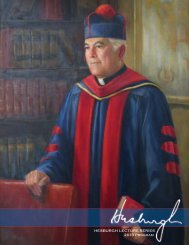HESBURGH LECTURE SERIES 2012 Program - Alumni Association ...
HESBURGH LECTURE SERIES 2012 Program - Alumni Association ...
HESBURGH LECTURE SERIES 2012 Program - Alumni Association ...
Create successful ePaper yourself
Turn your PDF publications into a flip-book with our unique Google optimized e-Paper software.
Rev. Oliver F. Williams, C.S.C., Ph.D., ’61, ’69 M.A.<br />
Associate Professor, Management; Fellow, Joan B. Kroc Institute for<br />
International Peace Studies<br />
Biography<br />
Rev. Oliver Williams, C.S.C., is an associate professor of management in the Mendoza College<br />
of Business, and director of the Notre Dame Center for Ethics and Religious Values in Business.<br />
Williams served as a member of the United Nations Observation Mission for South Africa’s first<br />
post-apartheid national elections in April 1994. He has studied the South African business and<br />
political landscape for many years, and is the author of The Apartheid Crisis. He is a co-editor<br />
of A Virtuous Life in Business and of 14 other books in the field, including Is the Corporation<br />
Dead? Social Responsibility in a Global Economy and Business Religion and Spirituality: A New<br />
Synthesis.<br />
As an associate provost of Notre Dame from 1987 to 1994, Williams served on the Provost’s<br />
Advisory Committee and chaired the University committees on continuing education, the disabled, and the academic honor<br />
code. In 1991, he chaired a special University committee that studied ways to enhance the ethical dimension of education at<br />
Notre Dame. In 2006, he was appointed a member of the three-person Board of Directors of the United Nations Global Compact<br />
Foundation. His most recent books include Global Codes of Conduct: An Idea Whose Time Has Come and Ethical Values and<br />
Peace Through Commerce: Responsible Corporate Citizenship and the Ideals of the UN Global Compact.<br />
Lectures<br />
Can You Do Well While Doing Good?<br />
Today, many believe that business ethics is an oxymoron. Following the spirit of the famous line, “an ambassador is an honest man<br />
lying abroad for the good of his country,” some business leaders conduct their operations as if the bottom line is the only concern.<br />
Is it possible to do well while doing good? Discussing many examples such as Microsoft, Anglo American, Coca-Cola, and Merck,<br />
the lecture outlines how it is possible to outline a way for a business manager to exhibit superior performance in business and yet<br />
be a model of virtue and ethical values.<br />
Recent Catholic Social Thought: a Remarkable Turn<br />
Catholic social teaching took a remarkable turn with the May 1991 document on economic ethics, Centesimus Annus. During<br />
their 100- year history, church documents were notable for their courageous championing of the rights of the least advantaged;<br />
they were much less distinguished for their understanding of how markets and incentives function in capitalism. With this 1991<br />
document, however, there is a growing conviction that the church may have come of age in economic ethics. The lecture outlines<br />
the highlight of the document and its points of continuity with the tradition, and the prospects for developing a spirituality for<br />
business life.<br />
South Africa: A Vision of the Future<br />
Each June and July, Williams teaches at the University of Cape Town in South Africa, working with emerging business leaders.<br />
The lecture outlines why he is so hopeful that South Africa will be the first success story of the continent.<br />
The United Nations Global Compact<br />
One of the more hopeful signs that the globalization of the economy might lead to a more humane world is the U.N. Global<br />
Compact, a new initiative (2000) intended to increase and diffuse the benefits of global economic development through voluntary<br />
corporate policies and actions. With a focus on human rights, labor rights, environmental stewardship, and anti-corruption<br />
activities, the Compact strives to give globalization a human face. Today there are more than 7,000 companies that have joined the<br />
Compact, as well as more than 1,000 non-government organizations (NGOs). The lecture outlines the Global Compact and how it<br />
might humanize global business in the future. Williams is a member of the four-person Board of Directors of the United Nations<br />
Global Compact Foundation.<br />
116 The Hesburgh Lecture Series, <strong>2012</strong> <strong>Program</strong><br />
Categories<br />
Business, Church, Ethics



